Exclusive:
Interview with John C. Wright
|
Adventures in Space & Magic Science Fiction & Fantasy writer John C. Wright is well-known for his epic "space opera" trilogy, and more recently, for his fantasy adventure novels. He's been called "this fledgling century's most important new SF talent" by Publishers Weekly. We were curious about his take on the state of fantastic adventure fiction today and asked him a few questions - also in connection with his appearance in the original anthology of military science fiction "Breach the Hull", ed. by Mike McPhail. John C. Wright (interviewed by Avi Abrams, Dark Roasted Blend) Art by Scott Fischer (used by permission, click to enlarge most images) 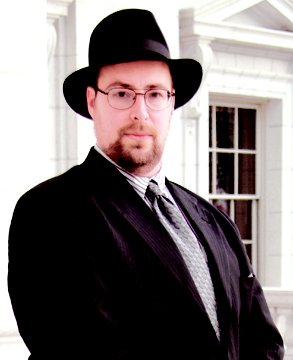 Photo by Beth Gwinn, John C. Wright's fiction, John C. Wright's journal Q: Some of our readers may not be familiar with your work. Can you give a brief introduction? JCW: I am the author of nine novels. "The Golden Age" is a space opera set in the farthest future, when human brain information can be replicated, stored and edited with sublime ease. It is the time of the immortals, a time of leisure for all mankind, human and superhuman and post-superhuman alike. Only one man is dissatisfied, and dreams of something greater than utopia. What was the dream so large that it could threaten the super-technological paradise of the Last Men? The second and third volumes of this work are called "The Phoenix Exultant" and "The Golden Transcendence".    "The Last Guardian of Everness" concerns a man whose wife is dying in the terminal ward. A necromancer offers that his wife will be granted extra life, if the man is willing to murder a stranger. The man agrees; the stranger turns out to be the last child of a warlock family who had been, since Merlin's time, secretly keeping the necromancer and all the hosts of the underworld locked behind the barrier of dreaming. The wife recovers, but is now haunted by the ghost of the murdered boy, and man has to discover the secrets of the family in order to find the dream-gate that has been pierced. This is a book of wonders: everyone from Koschey the Deathless to Oberon the Fairy-King is here, also included are storm-kings and moon-things, a mysterious radio-play vigilante in black, the Great God Apollo, the entire United States Pacific Fleet, a haunted mansion and the Most Holy Grail. Its second volume is called "The Mists of Everness" 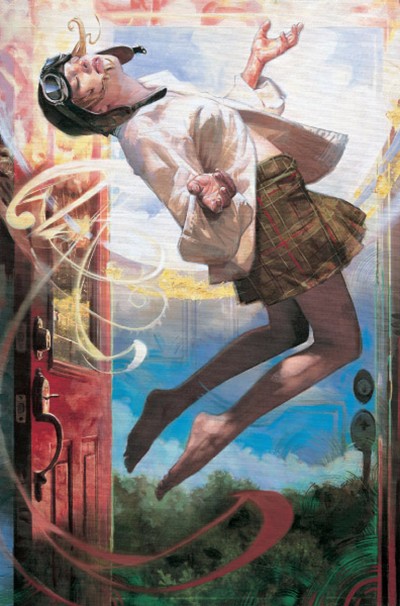 Art by Scott Fischer "Orphans of Chaos" concerns a girl raised in an institution. No record is kept of her age. Apparently her eighteenth birthday has come and gone, and perhaps her twenty-first as well, and yet the boarding school where she and her four friends are kept shows no inclination to declare her an adult and release her. She seems not to be aging, even though the townsfolk are. Are the orphans even human beings at all? One night she spies on a meeting of the board of visitors and governors of the school. It turns out the school is not a school at all, but a prison camp, and her teachers are witches, mermaids, pagan gods, things stranger yet. The five orphans are all royal hostages from the netherworlds of Chaos that exist outside the order of space and time, that threaten to break the walls of the world and lay the Cosmos to waste if she escapes. The tale concerns how she and her friends escape the prison they hate without destroying the world they love. The second and third volume are called "Fugitives of Chaos" and "Titans of Chaos". I realize this is only eight books: my ninth is coming out next year. 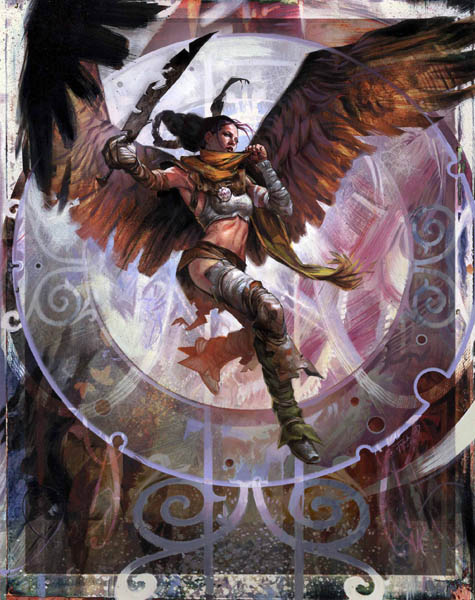 Art by Scott Fischer Q: How long you've been in sf&f field? Did you have any professional writing training, how easy was it to break into the scene? Any advice to newcomers? JCW: In one sense, I have been in the SF&F field since my first story, "Captain Spectacular", which I wrote and illustrated in Fifth Grade. I have been writing science fiction my whole life, and have never had the desire for any other profession. Selling it is another matter entirely. I made my first sale in 1994, a short story called "Not Born a Man" to a small magazine called Aberrations. That was followed in 1995 by a novella called "Farthest Man from Earth" sold to Isaac Asmiov's, which won me some modest acclaim. I have no professional writing training, but I did have experiences that helped me. I have been both an attorney and journalist. An attorney learns to agonize over each word and comma when he writes - if you doubt me, reflect upon debates about the meaning of a comma in the Second Amendment. As a journalist, I worked on a paper that bought as many as fifteen articles of mine a week: I learned to write in one draft, quickly. Now, whether I can combine the care of the first with the productivity of the second, without sacrificing the one to the other, I leave to the candid judgment of my readers. 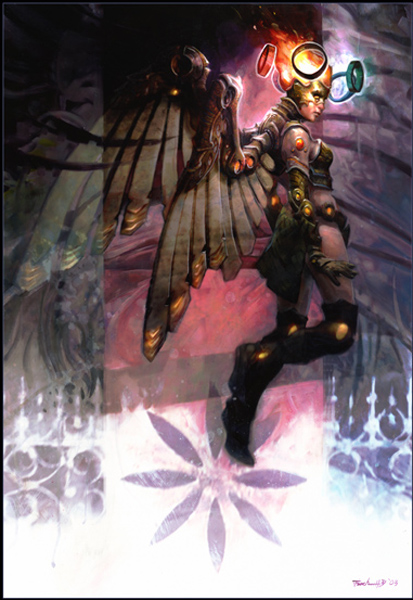 Art by Scott Fischer --------- Of course I have advice to newcomers! Here it is: 1. In order to be a writer, you must write. 2. In order to write, you must use proper spelling, punctuation, grammar; or, if you violate these rules, the violation must be deliberate, to create an artistic effect. Avoid politically correct jargon at all costs. Do not use ugly constructions like "he or she"; it will date your work, and the cool people will laugh at you. 3. In order to be a writer, you must sell what you write. No manuscript should spend a single night on your desk; the same day you get a rejection, put the manuscript in the mail to the next editor. Let the manuscripts spend their nights on the editor's desk. 4. In order to sell what you write, read the editor's guidelines for his magazine or publishing house and follow them. These guidelines are available in a reference book called Writer's Market. Get the reference book for the current year. If the guidelines say double-spaced white paper single sided, and no samurai vampire stories, do not send him "Lightning Swords of the Nosferatu of Kyoto" printed on blood-red paper, single-spaced, double sided. Failure to follow the guidelines shows you are a dude, a tenderfoot, a punk, a novice, not someone meant to be treated with professional courtesy. Your story is your child: no mother would send her child out to look for a job without fixing his tie and shining his shoes. 5. Include a self-addressed stamped envelope with proper postage affixed, if you want the manuscript back. 6. You will receive on average ONE HUNDRED rejection slips before you make your first sale. This is an average. This means that if someone, say, Lester del Rey, makes his first sale on his first attempt without getting a rejection, that someone else, say, Ray Bradbury, will get two hundred rejection slips. 7. If your manuscript is good or bad, send out your manuscript again. Genius does not count. Only persistence counts. The world will not recognize your genius until after you are dead. But the world can recognize your persistence now. 8. If the manuscript is good, send out your manuscript again. The editor who rejected it last month or last year may have different needs or a different budget this month or this year. 9. If the manuscript is bad, send out your manuscript again. The worst thing you ever wrote will someday, somehow, be some schoolboy's favorite story ever. Your readers are your employers. Respect and fear them. Do not approach this work with pride or selfishness or any of the other emotions to which men of fragile artistic spirits are inclined. It is a profession. Act professionally. Q: Is there any particular fix, that helps your creative process? Coffee, hiking, time with family, etc? JCW: No. The so-called creative process consists of sitting down at scheduled times for scheduled amounts of time and actually doing the work of writing. It is the same creative process used by a cobbler to make a shoe, or a carpenter to make a chair. It is accomplished by not making excuses to not accomplish it. 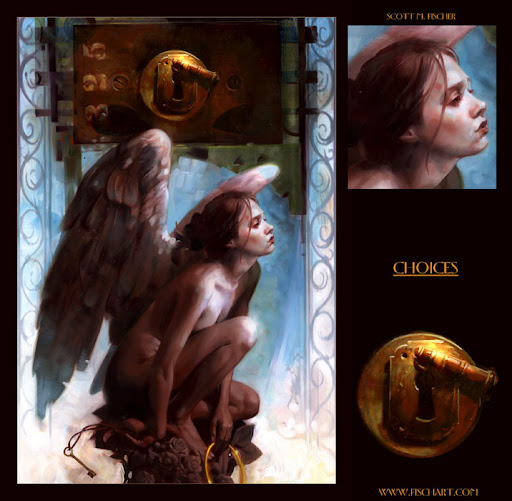 Art by Scott Fischer Q: Who influenced your work early on; influences in art, fiction, life experiences? JCW: In order: A.E. van Vogt, H.P. Lovecraft, Lord Dunsany, Peter S. Beagle, Olaf Stabledon, Robert Heinlein, Keith Laumer, Jack Vance, Gene Wolfe. A.E. van Vogt taught me that a hero is a man who is saner than his foes, not necessarily the stronger. H.P. Lovecraft and Lord Dunsany taught me of things in the twilight lands beyond the fields we know. Peter S. Beagle taught me magic walks among us, unrecognized, but fair and elusive as moonlight. Olaf Stabledon taught me that eternity is vast, man is strange, life is precious, and the universe is indifferent. Robert Heinlein taught me to sneer at others and mock deep wisdom, and call this attitude virtue (this is one lesson it took me many painful years of effort to unlearn). Keith Laumer taught me that heroes keep staggering clumsily on no matter how badly beaten they are. Jack Vance taught me that even exquisite self-justifications uttered by villains are, in the end nuncupatory. Gene Wolfe taught me that mysteries can be hidden in plain sight. I also read and was influenced by Epictetus, Seneca, Cicero, and Marcus Aurelius. Q: If given a choice, who of the great science fiction / fantasy writers you would have a pint / coffee with? JCW: Gene Wolfe. 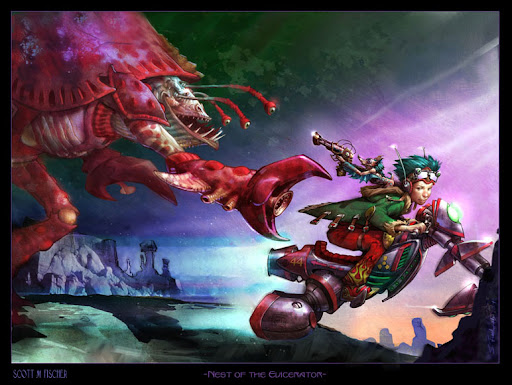 Art by Scott Fischer Q: Your fiction has plenty of adventure, action, scale and color. Do you consider it important to keep the readers thrilled? JCW: I would venture to say that if you are reading a yarn where there are no space-pirates and no space-princesses, if the Dinosaurs of Mars never make an appearance, if no space-marine shoots through the core of the planet with a hand-weapon in order to kill an enemy standing on another continent, if no ancient alien artifacts larger than worlds stir into life after a million years of dormancy, and if not a single planet is blasted into molten asteroids, no star into a nova star, no galaxy into a Seyfert galaxy, no universe into a new Big Bang, then what you are reading might not be space opera. Space opera should contain at least one of these elements. Q: You have been in the forefront of recent "space opera" renaissance; so what do you think is in store for this sub-genre? Is it going to just fizzle into usual military fiction fare? By the way, what's the difference between space opera and military sf? JCW: Naturally I am pleasantly surprised you credit me as being in the forefront of the space opera renaissance. Usually other names are mentioned in this regard, and my own humble contribution is overlooked. Thank you. But I have only written one trilogy that counts as space opera. This particular sub-genre consists of those stories that rely for their primary affect on the reader on an emphasis on the large-scale, astonishing, heroic, larger-than-life elements. It is the sheer, almost oppressive, wonder at astronomical sizes and magnitudes the supports the genre: it is the genre of gigantism. Recent discoveries in astronomy have, I think, reinvigorated the genre: Stephen Baxter takes the Great Attractor, a zone of space toward which thousands of galaxies are streaming, and supposes it to be a megascale artifact. It is a brilliant conceit and one I must remember to steal without a twinge of conscience in my own work. The future? These things go in rounds; tastes change. Naturally the appeal of this genre fades whenever the readership grows accustomed to, and hence weary of, depictions of larger-than-life heroics set against astronomically huge backgrounds. We may have to wait for the next round of astonishing astronomical discoveries to see the Third Wave of Space Opera a generation from now. I doubt it will fizzle into military SF, if I understand what is meant by these admittedly imprecise terms. Space Opera relies for its primary appeal on gigantism; military SF relies for its primary appeal in military realism set against a fantastic setting. Instead of giving a definition, I will give an example. What reminds you of the Lensmen series by E.E. Doc Smith is Space Opera; what reminds you of Starship Troopers by Robert Heinlein is Military SF. Note that the larger-than-life hero, end-product of a thousand years of selective breeding, Kimball Kinnison, is never shown in boot camp or officer's training school. That would be a realistic military detail. On the other hand, Mr. Rico is never shown performing any larger-than-life act of heroism, but rather, the author takes pains to detail the ordinary and unsung heroism of the average infantry man. Indeed, the first line in the book concerns his ordinary and realistic fears in the face of the bizarre orbit-to-ground parachute drop that the futuristic grunt faces. "I always get the shakes before a drop…" It is the insertion of little quotidian camp-life or operational details into military SF that gives it its appeal. One cannot imagine an inertialess planet being used to destroy whole worlds at one blow in this background, or a negasphere, or a hyperspatial tube. Q: You changed writing direction from space opera to fantasy and mentioned that you do not want to be pigeon-holed in any particular sub-genre: are you not afraid that you lose certain reader's loyalty and "brand recognition"? JCW: Yes, I am not afraid. I buy my books by name-recognition. I'll read a Jack Vance mystery novels, for example, or one by Keith Laumer. I assume my readers likewise. Q: What story/novel/movie can't be banished from your memory, no matter how you try? Which one you actively hated? JCW: In school I was required to read a series of short stories by Flannery O'Connor, which consisted, as my dim recollection serves, of grotesque people committing acts of pointless cruelty on each other: a selfish grandmother being shot by a remorseless escaped convict, whose claim that he was innocently convicted excuses his coldblooded murder of her family; a one-legged girl who fancies herself a philosopher being robbed of leg by a cruel boy who lives up to the cynicism her philosophy merely plays at; retarded girls being married to shiftless drifters and abandoned in roadside diners, with no ability to talk to anyone, no identification, and hence no ability even to describe to anyone the mother and home she dimly misses. At the time I was a schoolboy, but my innate sense of decency was sufficient to recoil from these stories as if from a vomit. Only as I grew older, upon reflection, did I realize what these stories stood for: a view of the world that mocks justice, that mocks philosophy, that mocks marriage, that regards these and all other human aspirations as not merely vain, but corrupt. I vowed at that young age to oppose that world view and everything it stood for. If there is a deeper meaning to her tales my schoolboy mind was unable to grasp, I confess I have not been sufficiently curious, or unable to overcome my natural revulsion, to go back and re-examine. If that makes me a philistine, so be it. 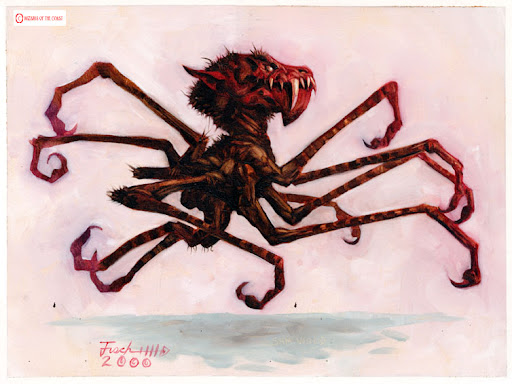 Art by Scott Fischer The only book that actually stirs me to hatred, however, is Ulysses by James Joyce. Mr. Joyce uses an experimental stream-of-nonsense style in order to put across his modernized version of the Odyssey: instead of acts of heroic valor that carry long-suffering Odysseus for ten years from fantastic islands beyond the world's edge, down to death and up again, from beggar to king to arrive again to his house, wife, throne, and son, in this obscene modern book we have Leopold Bloom, cuckold, drifting through turn-of-the-century Dublin. We see him do things like defecating in an outhouse, or pointing out a dent in a friend's hat. All is surrounded by verbal gibberish. It has the same relationship to a real novel as a Rorschach blot has to a real painting. As in a Rorschach blot, any meaning, including parallels to the Odyssey, can be invented freely by critics and students of literature and shoehorned to fit. Naturally, this frees critics and students of literature from the onerous burden of having to study and understand a work of literature before commenting on it. In effect, they get the same reward for no effort, where this book is concerned: small wonder it is highly regarded in their field. My hatred is not for the book itself, which is deliberately written (such was the author's queer humor) to be as ridiculous as possible. No; is for the influence this deceitful book, and all it clamoring fellow-travelers and fifth columnists, have had on the literature of my lifetime. The literary world turned its back, for three generations, on the ideals of truth and beauty. Winter came and all the trees fell nude, and no birds sang. The poetry has vanished from the earth as completely as it did the day the Tower of Babel fell, and for the same reason: words were replaced by nonsense. Beauty is mute. For the first time in human history, and songs have fallen silent. Instead, we have noise, chanting, drumbeats, and the only things heard praised are arrogance and mere ugliness. 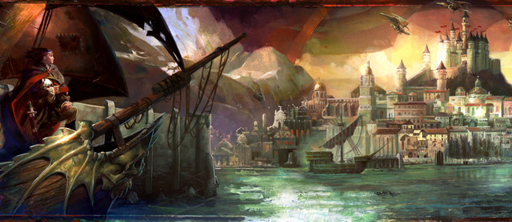 Art by Scott Fischer (fragment, click to enlarge) If you want to hear a song with a tune whose words ring out about the bright and glorious things in life, swords and strongholds, kings and ships and shining stars, you have to wait until Christmastime. Aside from then, it is nowhere but in science fiction and fantasy that the old heroism, swords, strongholds, kings, ships, stars, is preserved, stories of the scope and wonder of Homer's Odyssey. What would "ugliness for the sake of ugliness" be in Latin? Turpis gratia Turpis? Such is the motto of the age in which we live, and I blame Joyce, and T.S. Eliot, and all those of like mind. Q: Anything to say on two strictly forbidden topics: politics and religion? JCW: Certainly. In politics, I favor the Solon of Athens over Lycurgus of Sparta, and in religion I favor Aquinas over Augustine. All commentary on politics and religion in the modern day are basically footnotes to these fundamental divisions. Q: What's in store for your readers? JCW: Thanks to the graciousness of the estate of A.E. van Vogt, I have been permitted to write a sequel to his famous books "World of Null-A" and "Players of Null-A". This is an awe-inspiring honor, for these books are simply my favorite books by my favorite author, the book that persuaded me to live my life as I do. My sequel, set in the same background is called "Null-A Continuum". No book I have written has given me such pleasure and such pride to write. "Null-A Continuum" is scheduled for release in March of 2008. And after that? I am currently at work on my new trilogy "Count to a Trillion". The plot here concerns a "sleeper" who is preserved by cryonics from era to era as the long history of man unfolds from the near future to the far. His wife departed aboard a nigh-to-lightspeed vessel to the galactic cluster M3 in Canes Venatici, 39000 lightyears hence: her mission is to plead with the titanic slower-than-light collaboration of patient machine-mind supersystems that govern the Orion Arm and most of the Milky Way for the freedom and salvation of the human race. After that, I have contracted to write a book of Christian apologetics. My take on the topic may be novel, at least in a way, since I used to be a card-carrying, vehement, passionate atheist. My plan for the book is to have every other chapter be written by my old self to my new, or my new self to my old, so that a dialog between the theist and the atheist ideas can be played out, without the particular personality of the philosopher (which in this case stays the same) tipping the dialog to one side or the other. The working title for that is "Letters from Tomorrow". Q: If you'd like to touch on other subjects you want our huge audience to consider, something you are PASSIONATE about, please do so. JCW: Certainly! I would like to urge everyone in your audience to be dispassionate! I passionately believe that the world's ill are caused or inflamed by unbridled, hysterical, vehement emotion. The only cure for this eruption of unreason is a return to the cold and disinterested use of logic to settle those disputes that can be settled with logic. The disputes that cannot be settled with logic must be settled with civility. Q: Please tell us three things about you that not many people know? JCW: 1. I studied the classics, but do not speak any Greek or Latin. I was trained as an attorney and passed the bar in three jurisdictions. I worked as a newspaperman, cartoonists, and newspaper editor for many years. 2. My father, my grandfather, and my firstborn son are all named Orville. 3. I married the most beautiful woman in the world, who will also be publishing her first novel next year. Her pen name is L. Jagi Lamplighter. (Her real name, of course, is Mrs. John Wright, thank you very much.)  Read John C. Wright's new story in "Breach the Hull", an original anthology of military sf. Read John C. Wright's new story in "Breach the Hull", an original anthology of military sf."Military science fiction consistently enjoys high level of popularity", says the book's editor, Mike McPhail. "We're already working on the sequels to "Breach the Hull": "So It Begins" (2008 or 09) and "By Other Means" (2010). Such small press publications are often the only way that an established author (or an up-and-coming one), can get their short stories published. In my experience, it mostly seems big houses only want what is currently selling, and are not interested in anything outside of that. In light of that, we fill an important niche." Labels: Features |
Click to go to "Dark Roasted Blend" site

|
Collecting Pulp Magazines Ephemera Interview with Avi Abrams |

|
Enchanting Victorian Fairy Tale Art "Then world behind and home ahead..." |

|
Exceptional British Scifi Artwork from the 1950s Space Pulp Art by Ron Turner and other British artists |

|
Pulp Pleasures: Eando Binder Great space adventure fiction from the 1930s "Where Eternity Ends" and other rare gems |
Also read recent posts:
Author's Pen Names - Most Complete List Ever
The Wonder Timeline: SF&F Restrospective
Space Adventure Article
|
"SF&F Reading Experience" is part of "Dark Roasted Blend / Thrilling Wonder" family of sites. We try to highlight the most entertaining and rewarding science fiction and fantasy, with emphasis on memorable reader experience, not necessarily general acceptance by the critics. Have fun, and delve into our extensive ratings and reviews! Most reviews are written by Avi Abrams, unless otherwise noted. Reviews also appear on our unique historical retrospective page Wonder Timeline of Science Fiction. Feel free to submit your own review, if a particular story is not listed here. All major OFFICIAL AWARDS are highlighted in BLUE ("winner" has a letter "W" by it, otherwise it is a runner-up only) Our PERSONAL AWARDS (ratings) are highlighted in RED and PURPLE: --/ first place : --/ second place : --/ third place : --/ fourth place : --/ cool : (equal to fifth place) ALL "BEST OF" LISTS ARE LOCATED HERE These awards are given in the following categories: - novel : - series : - novella : - story : - collection : Also, there are our personal STYLE / GENRE SPECIFIC AWARDS. These reflect the story's content and the lasting impression on the reader: --/ wonder award sense-of-wonder, "visual intensity" and inventiveness --/ idea award originality of idea / concept --/ adventure award exhilarating plot, excitement / action --/ style award outstanding literary qualities, inimitable style --/ romance award intense and beautiful love / relationships --/ humour award funny and cool --/ emotion award touching, lasting impression, sensitivity --/ shock value altogether wild --/ awesome scale mind-boggling; further enhances sense-of-wonder --/ rare find very hard to locate, mostly from old pulps, never reprinted, etc. Again, please feel free to leave your own review or comment under every writer's entry; also recommend us other stories you liked. |

1 Comments:
If you enjoy some pretty awesome imagination prostituted to masturbatory Libertarianism, Wright is the writer for you.
Post a Comment
<< Home